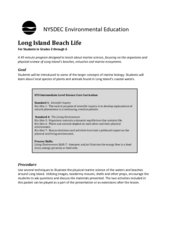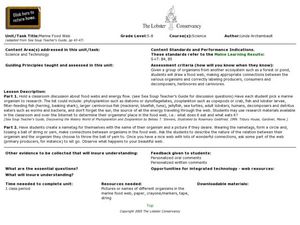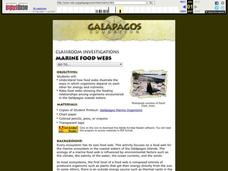NOAA
Understanding Food Chains and Food Webs
Jump into an exploration of marine ecosystems with the first lesson in this four-part series. After first learning about crustaceans, mollusks, and other forms of sea life, young marine biologists view a PowerPoint presentation that...
University of Waikato
Build a Marine Food Web
Dive into a lesson on marine ecosystem interactions. Individuals learn about and devise a marine food web. The resource provides organism cards and pupils use article resources to discover interactions before modeling them in a food web.
Curated OER
Long Island Beach Life
Have your class learn about marine life through this resource. This comprehensive lesson has learners discuss marine life, learn key vocabulary, discuss environmental concerns, and play games related to migration and predator/prey...
Sargent Art
Protect Our Marine Life
Encourage water conservation and boost art skills with a hands-on activity that challenges young painters to create a scene highlighting marine life. Using oil pastels, scholars draw an underwater scene and write a tip for viewers to...
NOAA
Marine Ecosystems
Be at the top of the food chain when it comes to understanding marine ecosystems. The 21st installment of a 23-part NOAA Enrichment in Marine sciences and Oceanography (NEMO) program investigates marine ecosystems, ocean zones, and food...
World Wildlife Federation
Food Chains and Food Webs
As part of a study of food chains and food webs, class members complete a series of worksheets that trace a marine chain from producers to consumers or decomposers. After studying a food chain example, young marine biologists make up...
NOAA
Deep-Sea Ecosystems – Life is Weird!
A pool of brine in the deep sea can be up to four times as salty as the surrounding sea water. The deep sea ecosystem relies on chemosynthesis and the organisms that live there are often strange to us. The lesson focuses on researching...
Curated OER
Marine Ecosystems
Students identify producers and consumers and construct a food chain from four marine ecosystems. They describe the delicate balance among organisms in each environment. In groups, students discuss the human activities that upset the...
Curated OER
Ocean Animals
Very young learners identify ocean animal pictures by their correct name and create a book of ocean animals. They read books and lean ocean animal vocabulary using the SMART Board. A well-designed lesson plan!
Curated OER
Week 8 - Sea Life
Using a magnifier, mini marine biologists examine the barbules of a bird feather. They swirl the it into a mixture of oil and water and then re-examine the feather. After the activity, discuss how the oily feathers pose a problem to sea...
Curated OER
Marine Mammal Diving Reflex
Tenth graders discuss marine mammal diving reflex, and measure pulse rate while holding their breath under three conditions: control, warm water, and ice water to determine if humans exhibit marine mammal diving reflex.
Ask a Biologist
It’s a Plankton Eat Plankton World
For as small as they are, plankton sure play an enormous role in maintaining marine ecosystems. Dive into an investigation of these tiny organisms with a hands-on life science activity in which children cut out pictures of sea animals...
NOAA
An Ocean of Energy
Young biologists trace the path of the sun's energy through marine ecosystems in the second part of this four-lesson series. Building on prior knowledge about producers, consumers, and decomposers students are introduced to the concept...
Curated OER
Marine Food Web
Students investigate the effects of the food chain on all animals by creating a food web. In this seafood lesson, students discuss energy flow and research a specific marine organism of their choice. Students create a food web in their...
Curated OER
Marine & Aquatic Habitats Activities - Terrestrial Forests vs. Kelp Forests
Students discuss concept and specificity of habitats, both marine and terrestrial, list similarities and differences in the habitats of a kelp forest and a terrestrial forest, compare types of organisms that occupy corresponding types of...
Curated OER
Marine Life Research and Persuasive Conservation Pamphlet
Tenth graders examine conservation and research a type of fish that is under environmental stress. In this conservation lesson students create a pamphlet about the conservation of a marine organism.
Curated OER
Food Chains and Food Webs
Fourth graders study intertidal organisms and their role in the food web. In this food web lesson, 4th graders read the book The Sea That Feeds Us and discuss food webs. Students study pictures of intertidal creatures and discuss their...
Curated OER
Weave an Aquatic Food Web
Students explore organisms that are part of interconnected food webs. In this food web lesson, students choose an animal and research what the animal eats. Students begin with the food chain and branch out into the interconnected web...
Curated OER
Lessons: Food Web
Young scholars use an interactive web-based food web game to gain familiarity with tropic levels and interactions. They already understand that in an ecosystem there are four basic tropic levels: producers, primary consumers, secondary...
Curated OER
Ocean Life Food Web
Students construct a food web representative of the Gulf of California. They use pictures to depict all of the organisms in the appropriate level of the web (producer, primary consumer, etc.)
Aquarium of the Pacific
Kelp Forest Conservation
There otter be a better way. As a class, groups work together to create a food web based on the organisms in the kelp forest. Budding scientists watch a video on the kelp forest to see how the organisms create a food web and hear about...
Curated OER
Marine Food Webs
Students examine how food webs illustrate the ways in which organisms depend on each other for energy and nutrients, and make food webs showing the feeding relationships among organisms encountered in the Gal??pagos coastal waters.
Curated OER
Aquatic Life
Sixth graders work in pairs to research information related to aquatic life using references from the World Wide Web. They present their findings in the form of an oral presentation to the class.
Howard Hughes Medical Institute
Ocean Acidification
Human impacts on the environment can sometimes be difficult to measure, especially under water! An activity centered on ocean acidification gives science scholars the opportunity to examine the effects of carbon dioxide on marine life....
Other popular searches
- Marine Science Food Web
- Marine Food Webs
- Marine Ecology Food Webs
- Marine Food Web Unit
- Marine Food Webs Project
- Marine Reptiles Food Web

























